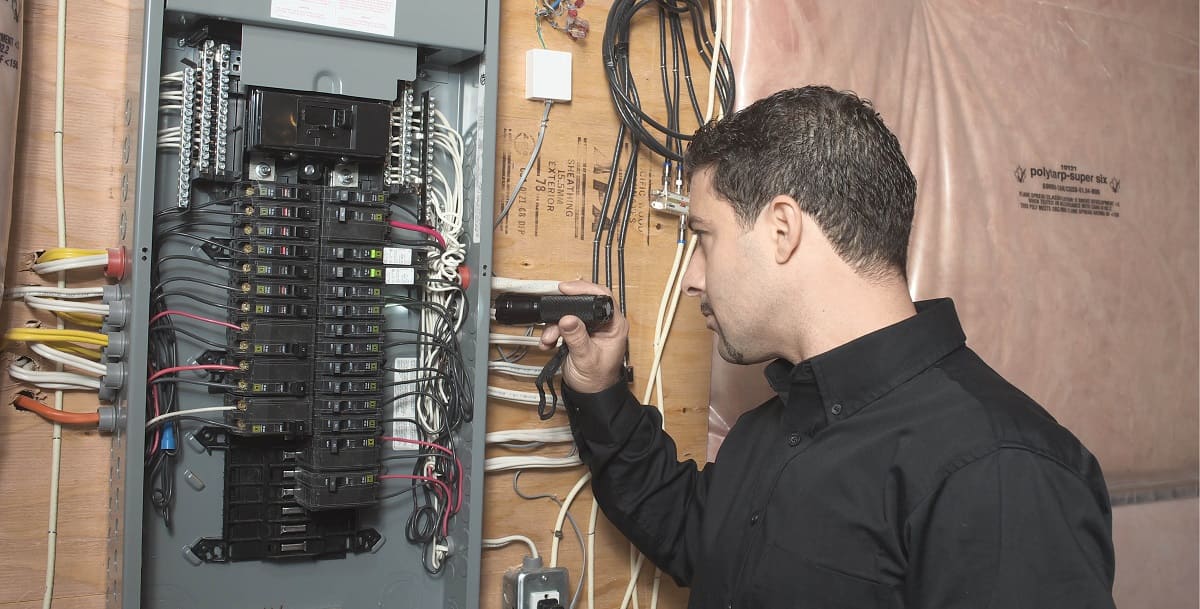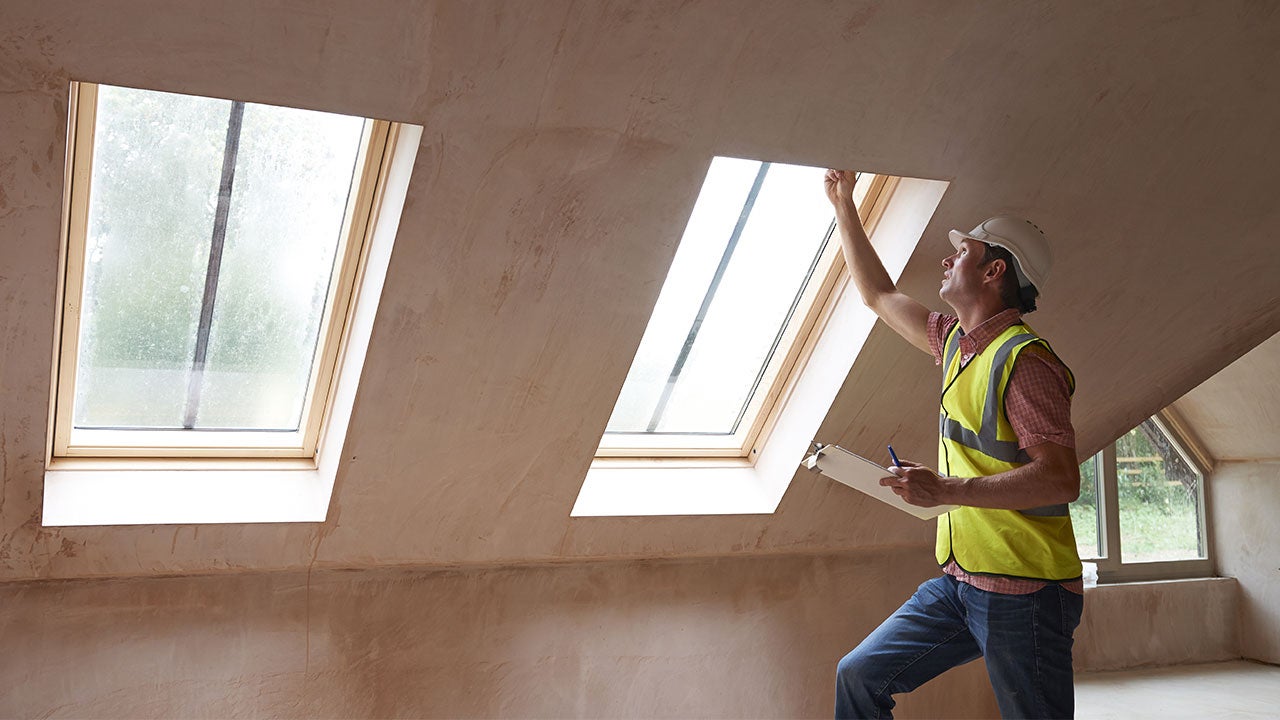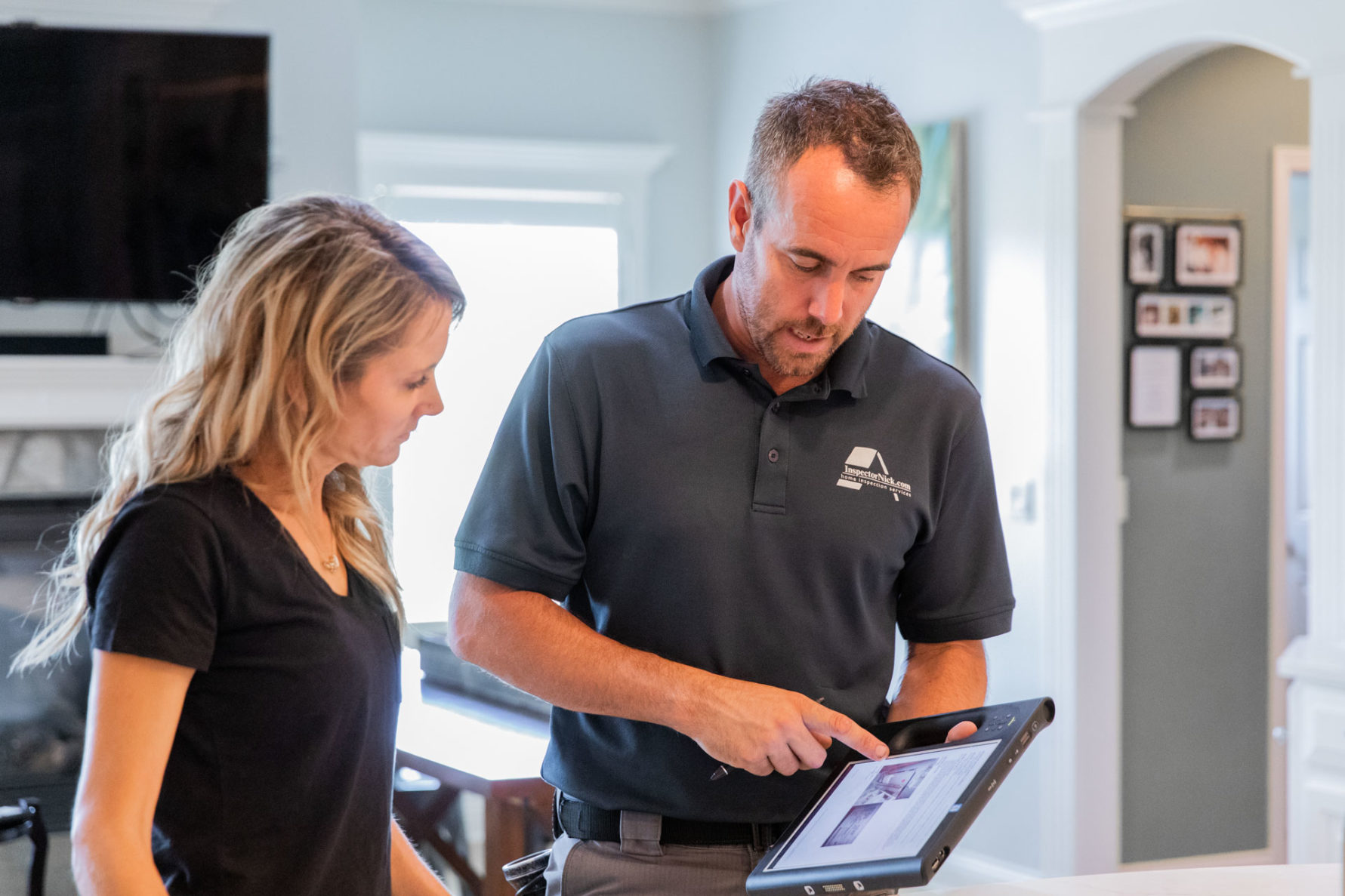Home>Home Maintenance>What Does Home Inspection For Buyers Do


Home Maintenance
What Does Home Inspection For Buyers Do
Modified: March 6, 2024
Home Inspection for Buyers: Discover the essential role of home maintenance with our comprehensive inspection services. Ensure a smooth and informed home buying process with our expert guidance.
(Many of the links in this article redirect to a specific reviewed product. Your purchase of these products through affiliate links helps to generate commission for Storables.com, at no extra cost. Learn more)
Introduction
Welcome to the world of home inspections for buyers! Whether you are a first-time homebuyer or a seasoned real estate investor, a home inspection is a crucial step in the purchasing process. It offers you the opportunity to thoroughly evaluate the condition of a property and make an informed decision before closing the deal.
Buying a home is a significant investment, and you want to ensure that you are making a sound financial decision. A home inspection provides you with a comprehensive assessment of the property’s structural integrity, safety, and overall condition. It gives you peace of mind knowing that you are well-aware of any existing or potential issues.
In this article, we will delve into the ins and outs of home inspections for buyers. We will discuss what a home inspection involves, the role of a home inspector, common issues detected during inspections, and the benefits of getting a home inspection. We will also explore how to understand the home inspection report and the steps to take after the inspection.
So, whether you are about to embark on your home-buying journey or have a property in mind, read on to discover why a home inspection is an essential part of the process and how it can protect your investment.
Key Takeaways:
- A home inspection helps buyers understand the condition of a property, identify potential issues, and gain negotiation power, providing peace of mind and confidence in their investment.
- After a home inspection, buyers should review the report, consult professionals, consider negotiations, prioritize repairs, and stay informed to make informed decisions and protect their investment.
The Importance of Home Inspections for Buyers
When it comes to purchasing a home, a thorough home inspection plays a vital role in the decision-making process. It offers buyers a comprehensive evaluation of the property, highlighting any existing or potential issues that may not be visible to the untrained eye. Here are some key reasons why home inspections are crucial for buyers:
- Evaluating the property’s condition: A home inspection allows buyers to assess the overall condition of the property. It provides valuable insights into its structural integrity, electrical and plumbing systems, HVAC (heating, ventilation, and air conditioning) systems, and more. Knowing the condition of these essential components can help buyers make informed decisions and potentially negotiate repairs or adjustments to the price.
- Identifying safety concerns: Safety should be a top priority when purchasing a home. A thorough inspection can identify safety hazards such as mold, asbestos, lead paint, faulty wiring, or structural issues. By uncovering these potential dangers, buyers can prioritize necessary repairs or take appropriate precautions before moving in.
- Avoiding surprises and future expenses: Hidden defects or maintenance issues can become a significant financial burden for homeowners. A home inspection helps buyers uncover these hidden issues early on, allowing them to factor in repair or replacement costs into their budget. By understanding the condition of the property, buyers can avoid unexpected expenses down the line.
- Negotiating power: Armed with a comprehensive home inspection report, buyers gain negotiation leverage. The report provides tangible evidence of the property’s condition and any issues that need to be addressed. Buyers can use this information to renegotiate the purchase price or request repairs or upgrades from the seller, which can potentially save them money in the long run.
- Confidence in the purchase: A home inspection provides buyers with peace of mind, knowing that they have thoroughly assessed the property and are making an informed decision. It reduces the risk of purchasing a property with significant hidden issues, allowing buyers to move forward with confidence in their investment.
In summary, a home inspection is essential for buyers as it provides a comprehensive evaluation of the property, identifies potential safety concerns, helps avoid unexpected expenses, offers negotiation power, and instills confidence in the purchase. It is an investment that can save buyers from costly surprises and ensure they make well-informed decisions when buying a home.
What Does a Home Inspection Involve?
A home inspection is a thorough examination of a property to assess its overall condition. It is typically conducted by a licensed and certified home inspector who specializes in evaluating the various components and systems of a home. Here are the key aspects that a home inspection may cover:
- Exterior Inspection: The home inspector will assess the exterior elements of the property, including the roof, gutters, downspouts, siding, windows, doors, foundation, and drainage systems. They will look for any signs of damage, deterioration, or issues that may affect the integrity of the structure.
- Interior Inspection: The inspector will thoroughly examine the interior elements, such as walls, ceilings, floors, stairs, doors, and windows. They will check for signs of water damage, mold, cracks, or other structural issues. Additionally, they will inspect the electrical systems, plumbing systems, and HVAC systems for functionality and safety.
- Roof Inspection: The condition of the roof is a crucial aspect of a home inspection. The inspector will evaluate the roof’s age, materials, condition, and potential leaks or damage. They will also examine the chimney, flashing, and any other roof-related components.
- Electrical Inspection: The home inspector will test the electrical systems, including the main electrical panel, circuit breakers, outlets, and light switches. They will check for proper grounding, wiring issues, safety concerns, and ensure that the electrical systems meet the required codes and standards.
- Plumbing Inspection: The inspector will assess the plumbing systems, including the water supply lines, drainpipes, faucets, toilets, showers, and water heaters. They will test for leaks, check water pressure, and ensure that the plumbing is functioning properly.
- HVAC Inspection: Heating, ventilation, and air conditioning (HVAC) systems are crucial for comfort and indoor air quality. The inspector will examine the heating and cooling systems, including the furnace, air conditioning unit, vents, ductwork, and filters. They will check for proper functioning, maintenance needs, and potential issues.
- Attic and Crawlspace Inspection: The inspector will assess the attic and crawl spaces to check for insulation, ventilation, and any signs of leaks, moisture, or pest infestations.
- Appliance Inspection: Some home inspectors may also include a basic assessment of the appliances that come with the property, such as the dishwasher, stove, refrigerator, and laundry machines. However, it’s essential to clarify this with the inspector beforehand.
It’s important to note that while a home inspection covers many aspects of a property, it is not a guarantee against future issues or defects. Inspectors can only assess what is visible and accessible at the time of the inspection. Hidden problems or issues that arise later may not be detected during the inspection.
By conducting a thorough examination of the property, a home inspection gives buyers a clear picture of its condition, allowing them to make informed decisions and plan for any necessary repairs or maintenance. It is a crucial step in the home buying process to protect the buyer’s investment.
The Role of a Home Inspector
A home inspector plays a critical role in the home buying process. They are responsible for evaluating the condition of a property and providing buyers with an objective and detailed assessment. Here are the key responsibilities and roles of a home inspector:
- Assessment of Property Condition: The primary role of a home inspector is to assess the overall condition of a property. They thoroughly examine various components such as the structure, foundation, roof, electrical systems, plumbing systems, HVAC systems, and more. They identify any existing or potential issues that may affect the safety, functionality, or value of the property.
- Objective and Impartial Evaluation: Home inspectors are independent professionals who provide an unbiased evaluation of the property. They do not have any vested interest in the sale of the property, ensuring that their assessment is impartial and objective. This allows buyers to receive an honest and accurate evaluation of the property’s condition.
- Knowledge and Expertise: Home inspectors have extensive knowledge and expertise in evaluating different aspects of a home. They are trained to identify potential issues, understand building codes and regulations, and have a deep understanding of construction and home systems. Their expertise allows them to provide a thorough and professional inspection.
- Education and Certification: To become a home inspector, individuals must undergo specific education and training. Many inspectors pursue certification through recognized organizations, such as the American Society of Home Inspectors (ASHI) or the International Association of Certified Home Inspectors (InterNACHI). Certification ensures that the inspector has received proper training and adheres to industry standards.
- Communication and Documentation: A crucial aspect of a home inspector’s role is effective communication with the buyer. They explain their findings in a clear and understandable manner, addressing any questions or concerns the buyer may have. Additionally, they provide a comprehensive written report documenting their findings, highlighting any issues identified during the inspection.
- Continuous Learning and Professional Development: Home inspectors are committed to staying up-to-date with industry trends, codes, and regulations. They often participate in ongoing education and professional development opportunities to enhance their knowledge and expertise. This allows them to provide the most accurate and up-to-date information to their clients.
- Professional Ethics and Standards: Home inspectors adhere to a strict code of ethics and professional standards. They conduct themselves with integrity, honesty, and professionalism, ensuring that they prioritize the best interests of their clients. This includes maintaining confidentiality, avoiding conflicts of interest, and following ethical guidelines.
Overall, the role of a home inspector is to provide an objective evaluation of a property’s condition, offering buyers valuable insights into potential issues and helping them make informed decisions. The knowledge, expertise, and professionalism of a home inspector are crucial in ensuring a thorough assessment and giving buyers confidence in their investment.
Common Issues Detected During a Home Inspection
A home inspection is designed to identify any existing or potential issues with a property. While the specific issues can vary depending on the age, location, and condition of the home, there are several common problems that are often detected during home inspections. Here are some of the most frequent issues:
- Roofing Problems: Roofing issues are quite common, including damaged or missing shingles, leaks, improper installation, or signs of wear and tear. These issues can lead to water damage, mold growth, or structural problems if left unaddressed.
- Electrical Deficiencies: Electrical issues pose safety risks and can range from outdated or faulty wiring to inadequate grounding or overloaded circuits. Home inspectors check for electrical code compliance, improper wiring connections, malfunctioning outlets, and other potential hazards.
- Plumbing Leaks or Problems: Leaky pipes, dripping faucets, slow drains, and poor water pressure are frequently discovered during home inspections. Additionally, inspectors look for signs of water damage, inadequate insulation, or faulty fixtures that may require repair or replacement.
- Structural Defects: Issues with the foundation, walls, or framing are critical to identify during a home inspection. These can include cracks in the foundation, improper construction, settlement issues, or signs of water damage that may compromise the stability of the structure.
- Heating and Cooling System Problems: HVAC systems are essential for comfort and energy efficiency. Inspectors assess the condition and functionality of heating and cooling systems, including furnaces, air conditioners, ductwork, and vents. They look for issues such as poor maintenance, improper installations, or potential safety hazards.
- Mold and Moisture Damage: Excessive moisture or mold growth can indicate underlying issues with leaks, poor ventilation, or water infiltration. Inspectors search for signs of mold, mildew, or water damage in areas such as basements, crawlspaces, attics, and bathrooms.
- Inadequate Insulation: Energy efficiency is a significant concern for homeowners. Home inspectors check the insulation levels in attics, walls, and crawlspaces. Insufficient insulation can lead to energy loss, temperature fluctuations, and higher utility bills.
- Safety Hazards: The safety of occupants is paramount. Inspectors look for potential safety hazards, such as exposed electrical wires, missing or faulty smoke detectors, inadequate fire safety measures, or unsafe staircases and railings.
It’s important to note that not all issues detected during a home inspection are deal breakers. The purpose of the inspection is to provide buyers with a comprehensive understanding of the property’s condition, allowing them to make informed decisions and prioritize necessary repairs or negotiations with the seller.
Should any significant issues be identified, buyers may have the option to negotiate repairs, request a price reduction, or decide to walk away from the purchase. The severity and impact of the issues will vary, and it is crucial to discuss the findings with the home inspector and seek professional advice if needed.
A thorough home inspection helps buyers make informed decisions, understand potential costs and maintenance requirements, and ensure that they are making a sound investment in a safe and functional home.
When buying a home, a home inspection helps you understand the condition of the property. It can uncover potential issues and give you peace of mind before making a big investment. Always hire a qualified and experienced home inspector to ensure a thorough evaluation.
Benefits of a Home Inspection for Buyers
Getting a home inspection when buying a property offers numerous benefits for buyers. It provides valuable insights into the condition of the property and helps buyers make informed decisions. Here are some key benefits of a home inspection:
- Peace of Mind: A home inspection provides buyers with peace of mind, knowing that they have thoroughly assessed the property and are making an informed decision. It reduces the risk of purchasing a property with significant hidden issues, allowing buyers to move forward with confidence in their investment.
- Identify Hidden Issues: Even well-maintained homes can have hidden issues that are not apparent during a visual inspection. A home inspection uncovers these hidden defects, such as faulty wiring, plumbing leaks, foundation problems, or mold growth. By identifying these issues early on, buyers can make informed decisions and plan for any necessary repairs or improvements.
- Negotiation Power: Armed with a comprehensive home inspection report, buyers gain negotiation leverage. The report provides tangible evidence of the property’s condition and any issues that need to be addressed. Buyers can use this information to renegotiate the purchase price or request repairs or upgrades from the seller, potentially saving them money in the long run.
- Cost Savings: A home inspection can potentially save buyers from expensive surprises down the line. By identifying any hidden issues or maintenance needs, buyers can plan and budget for necessary repairs or upgrades. It allows them to make an educated decision about the overall cost of owning the property and avoid unexpected expenses in the future.
- Evaluate Safety Concerns: Safety should be a top priority when purchasing a home. A home inspection can uncover safety hazards such as mold, asbestos, lead paint, faulty wiring, or structural issues. By identifying these potential dangers, buyers can prioritize necessary repairs or take appropriate precautions before moving in, ensuring the safety of their family.
- Awareness of Maintenance Requirements: A home inspection provides buyers with a greater understanding of the maintenance needs and requirements of the property. It gives them insights into the condition of various components such as the roof, HVAC systems, plumbing, and electrical systems. This knowledge allows buyers to plan for ongoing maintenance, which can help extend the life of these components and prevent costly repairs in the future.
- Learn About Energy Efficiency: Some home inspections may include an assessment of the energy efficiency of the property, including insulation, windows, and appliances. This information can help buyers understand potential energy-saving opportunities and make informed decisions about upgrades or improvements that may result in long-term cost savings.
- Objective Evaluation: A home inspector provides an objective evaluation of the property. They are trained to identify issues and provide an unbiased assessment. This objective evaluation gives buyers confidence in their decision-making process, knowing that they have received an independent and professional evaluation of the property.
A home inspection is a crucial investment for buyers. It provides them with valuable information about the property’s condition, identifies potential issues, and allows for negotiation and planning. By understanding the benefits of a home inspection, buyers can make informed decisions and ensure a smooth and successful home purchase.
Understanding the Home Inspection Report
After a home inspection is completed, the home inspector provides a detailed report that outlines their findings and observations. The inspection report is a crucial document that helps buyers understand the condition of the property and make informed decisions. Here are some key points to keep in mind when reviewing and understanding a home inspection report:
- Structure and Organization: A well-organized inspection report will have sections that cover different aspects of the property, such as the exterior, interior, roofing, electrical systems, plumbing, HVAC, and more. Each section should provide clear descriptions, details, and findings specific to that area.
- Summary of Findings: The report typically starts with a summary or executive summary that provides an overview of the inspection findings. This section highlights any major issues or concerns that need immediate attention or further evaluation.
- Detailed Descriptions: The body of the report contains detailed descriptions of the inspector’s findings and observations. It should clearly outline any issues, defects, or areas of concern that were identified during the inspection. The descriptions may include photographs or diagrams to help illustrate the issues.
- Prioritization of Issues: The report may prioritize the identified issues based on their severity or potential impact. This prioritization helps buyers understand which issues require immediate attention or further evaluation. It can help guide decision-making regarding repairs, negotiations, or seeking professional opinions on specific areas of concern.
- Recommendations and Suggestions: A comprehensive inspection report may include recommendations or suggestions for addressing the identified issues. This can include repair options, maintenance practices, or advice on seeking specialized evaluations or opinions from other professionals, such as electricians, plumbers, or structural engineers.
- Inclusion of Supporting Materials: Depending on the home inspector’s practices, the report may include additional supporting materials such as photographs, diagrams, or technical documentation to provide further clarification or evidence regarding specific findings.
- Scope and Limitations: It’s important to understand the scope and limitations of the inspection. The report should clearly state what was included in the inspection and areas that were inaccessible or not examined due to various limitations. This helps manage expectations regarding what the inspector could and could not assess.
- Review with the Inspector: It’s recommended to review the inspection report with the home inspector to ensure a clear understanding of the findings. The inspector can provide additional explanations, answer any questions, and offer guidance on how to interpret and address the issues outlined in the report.
Understanding the home inspection report is vital for buyers as it provides them with a detailed assessment of the property’s condition. It empowers buyers to make informed decisions, negotiate repairs or adjustments, budget for maintenance or upgrades, and seek professional advice as needed. By thoroughly reviewing and comprehending the inspection report, buyers can confidently move forward in their home buying process.
Steps After the Home Inspection
Once the home inspection is complete and the inspection report has been received, buyers should take several important steps to make the most of the information provided. Here are the key steps to consider after the home inspection:
- Review the Inspection Report: Carefully review the home inspection report, paying close attention to the findings, descriptions, and recommendations provided by the inspector. Take note of any major issues, safety concerns, or areas requiring further evaluation or repairs.
- Consult with Professionals: If there are significant issues identified in the inspection report, it may be wise to consult with professionals such as contractors, electricians, plumbers, or structural engineers. These experts can provide specialized evaluations and estimates for repairs or renovations, helping buyers make informed decisions regarding next steps and associated costs.
- Consider Negotiations: Armed with the information from the inspection report, buyers can determine whether to negotiate with the seller regarding repairs, upgrades, or adjustments to the purchase price. The report can be used as a reference to support negotiations and potentially save buyers from costly repairs down the line.
- Prioritize Repairs: Assess the identified issues in the inspection report and prioritize the necessary repairs or improvements accordingly. Some issues may require immediate attention for safety or structural reasons, while others may be less urgent. Create a plan for addressing the issues based on available resources, budget, and time constraints.
- Obtain Repair Estimates: For significant repairs or renovations, obtain estimates from reputable contractors or professionals to understand the cost and scope of the work involved. This information can help buyers budget appropriately and negotiate any necessary adjustments to the purchase contract.
- Revisit Financing Options: If the inspection report reveals substantial issues that impact the property’s value or condition, it may be necessary to revisit financing options. Some lenders may require repairs to be completed before finalizing the loan, so it’s important to communicate any significant findings with the lender and explore the available options.
- Request a Reinspection: In some cases, it may be advisable to request a reinspection by the home inspector to verify that any requested repairs or remedies have been completed satisfactorily. This provides additional assurance that the identified issues have been properly addressed before proceeding with the purchase.
- Stay Informed: Throughout the process, keep open lines of communication with the real estate agent, lender, and any other parties involved. Stay informed about important deadlines, documents, and decisions to ensure a smooth and successful closing.
It’s important to note that the steps after the home inspection may vary depending on the specific circumstances of the property and the buyer’s goals. Consulting with professionals, considering negotiations, prioritizing repairs, and staying informed help buyers navigate the post-inspection process effectively and make informed decisions regarding the purchase of the property.
Conclusion
A home inspection is a crucial step in the home buying process, offering buyers a comprehensive assessment of the property’s condition and helping them make informed decisions. By thoroughly evaluating the various components and systems of a home, a home inspector provides valuable insights into potential issues and safety concerns that may not be apparent to the untrained eye.
Throughout this article, we have explored the importance of home inspections for buyers. We discussed the benefits of getting a home inspection, including peace of mind, identifying hidden issues, negotiating power, cost savings, evaluating safety concerns, and understanding maintenance requirements. A home inspection empowers buyers to make confident decisions, plan for necessary repairs or upgrades, and protect their investment.
Understanding the home inspection report is crucial for buyers as it provides a detailed assessment of the property’s condition. By reviewing the report, consulting with professionals, considering negotiations, and prioritizing repairs, buyers can make informed decisions and take appropriate action before finalizing the purchase.
Remember that a home inspection has limitations, and not all issues can be detected during the inspection. Ongoing maintenance, regular inspections, and addressing minor issues promptly can help ensure the long-term safety and condition of the property.
In conclusion, a home inspection is a valuable investment that provides buyers with peace of mind, valuable information, and negotiation leverage. It allows buyers to fully understand the condition of the property and make informed decisions based on accurate and objective assessments. By engaging the services of a qualified and experienced home inspector, buyers can navigate the home buying process with confidence, knowing that they are making a well-informed investment in their future home.
Frequently Asked Questions about What Does Home Inspection For Buyers Do
Was this page helpful?
At Storables.com, we guarantee accurate and reliable information. Our content, validated by Expert Board Contributors, is crafted following stringent Editorial Policies. We're committed to providing you with well-researched, expert-backed insights for all your informational needs.















0 thoughts on “What Does Home Inspection For Buyers Do”